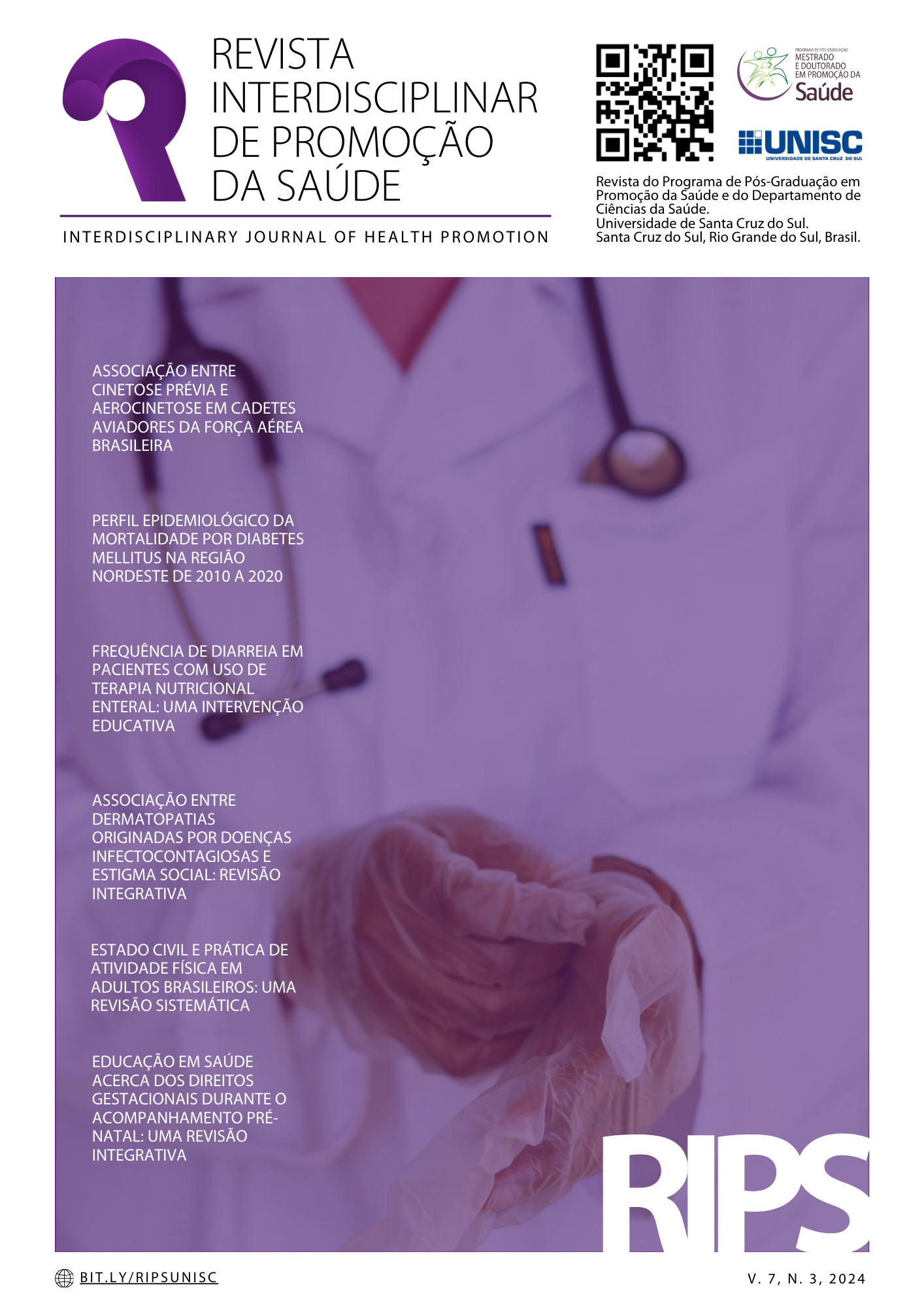ASSOCIATION BETWEEN SKIN DISEASES RELATED TO INFECTIOUS ILLNESSES AND SOCIAL STIGMA: AN INTEGRATIVE REVIEW
DOI:
https://doi.org/10.17058/rips.v7i3.17925Keywords:
Doenças de pele, Estigma Social , Doenças ContagiosasAbstract
Introduction: the social judgment related to infections is a crucial factor when discussing skin diseases, and its expressions perpetuate suffering and affliction to stigmatized individuals. Objective: systematize data from scientific knowledge while aiming to discuss and understand the existing association between skin diseases related to infectious illnesses and social stigma. Method: consists in an integrative review of literature, performed in july 2022, in PubMed database, using Medical Subject Headings ‘’skin disease’’, ‘’social stigma’’ and ‘’communicable disease’’, and their equivalents in brazilian portuguese. PRISMA recommendation was used in this article and, then, the following guiding question was elaborated: how does the social stigma related to skin diseases of infectious illnesses show up? Inclusion criteria were original articles, published in the last five years, free and reviewed by pairs. Review articles, meta-analysis, articles written in languages other than portuguese and english and the ones that evade the guiding question were excluded. Therefore, three articles were chosen to integrate the final sample. Results: stigmatization of populations stricken by skin diseases related to infections may expose them to adverse stressful contexts, considering a social point of view. Conclusion: sanitary measures associated with systematizing information about treatment and transmission of skin diseases may reduce economical and social impacts.
Keywords: Skin disease; Social stigma; Communicable disease.
Downloads
References
Ginsburg LH, Link BG, York N. Feelings of stigmatization in patients with psoriasis. Stanford: Elsevier; 1989. 53 p. doi: https://doi.org/10.1016/S0190-9622(89)70007-4.
Penha MA, Santos PM, Miot HA. Dimensioning fear of dermatologic diseases. An Bras Dermatol São Paulo: SBD; 2012; 87(5):796-9. doi: https://doi.org/10.1590/S0365-05962012000500027.
Lopes De Sousa Muñoz R, Débora L, Miguel P. Estigma e discriminação sociais como fardo oculto no processo saúde-doença. João Pessoa: UFPB; 2020. 87 p.
Tavares de Souza M, Dias da Silva M, de Carvalho R. Revisão integrativa: o que é e como fazer Integrative review: what is it? How to do it? São Paulo: Einstein; 2010; l(8):1. doi: http://dx.doi.org/10.1590/s1679-45082010rw1134.
Fabian K, Molina Y, Kemp CG, Nevin PE, McCoy K, Simoni JM, et al. Internalized HIV-Related Stigma and Breast Health Beliefs Among African–American Women Receiving Care for HIV in the USA. JREHD 2020 Feb 1; 7(1):45–51. doi: http://dx.doi.org/10.1007/s40615-019-00632-6.
Shin SS, Carpenter CL, Ekstrand ML, Yadav K, Shah S v., Ramakrishnan P, et al. Household Food Insecurity as Mediator of the Association Between Internalized Stigma and Opportunistic Infections. AIDS and Behavior 2018 Dec 1; 22(12):3897–904. doi: http://dx.doi.org/10.1007/s10461-018-2193-3.
Phipps E, Pietzsch ME, Cassell JA, Humphreys C. The public health importance of scabies in community domiciliary care settings: An exploratory cross-sectional survey of health protection teams in England. Epidemiology and Infection 2019; 147. doi: http://dx.doi.org/10.1017/S0950268819001274.
World Health Organization (WHO). Country protocol for developing the WHO quality of life (WHOQOL): HIV/AIDS module. Geneva: WHO; 1997.
Carvalho MV de F, Silva AR dos S, Taminato M, Bertolozzi MR, Fernandes H, Sakabe S, Hino P. A coinfecção tuberculose/HIV com enfoque no cuidado e na qualidade de vida. Acta Paul de Enferm 2022; 35. doi: http://dx.doi.org/10.37689/acta-ape/2022ao02811.
Franco-Paredes C, Marcos LA, Henao-Martínez AF, Rodríguez-Morales AJ, Villamil-Gómez WE, Gotuzzo E, Bonifaz A. Cutaneous Mycobacterial Infections [Internet]. CMR 2018; 32(1). doi: http://dx.doi.org/10.1128/CMR.00069-18.
Dofitas BL, Kalim SP, Toledo CB, Richardus JH. Stigma, psychosocial and economic effects of yaws in the Philippines: an exploratory, qualitative study. Trop Med Health [Internet]. 2022 Dec 6; 50(1):43. doi: https://doi.org/10.1186/s41182-022-00433-4.
Downloads
Published
How to Cite
Issue
Section
License
A submissão de originais para este periódico implica na transferência, pelos autores, dos direitos de publicação impressa e digital. Os direitos autorais para os artigos publicados são do autor, com direitos do periódico sobre a primeira publicação. Os autores somente poderão utilizar os mesmos resultados em outras publicações indicando claramente este periódico como o meio da publicação original. Em virtude de sermos um periódico de acesso aberto, permite-se o uso gratuito dos artigos em aplicações educacionais e científicas desde que citada a fonte conforme a licença CC-BY da Creative Commons.




